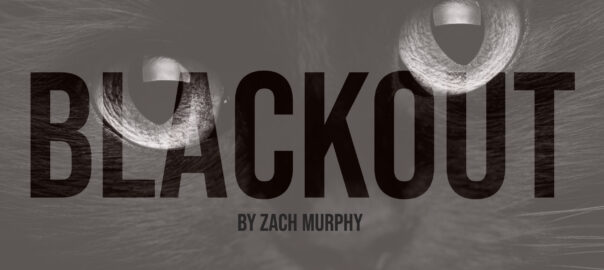
Four Poems by Adam Deutsch
Heme
You just want to be held
up, like a bullet a movie character
embraces between fingers
before dismissing it to the floor,
and want to remain nearby
when a hammer’s done driving.
That hollow slam can be a reason
for living—can be grief that
your life went on, until
a machine lights you up.
A burn through a pipe
and air, cloth and skin
and what’s covered. If
you must arrive, lodge
somewhere, love half your body
given up to a world
you can only compare
to your own radius. This
much deterioration you’d
hold anyone with you through.
And I do not want
a card in response
to this passing.
We’re always dancing
with speculation
in a street. Maybe
it’s blood. It’s lipstick,
a wine-dark crayon
in the sun, our hero
shaped from a candle’s
carcass, cold honey
that’s crystalized. It’s
a healing prism
in January’s frozen waters.
There’s an ornament
on the shelf we made
that will be taken
sooner or later
the way stars take
ice by melting it
and teaching it to run.
Maybe spilling away
feels good, and we should
be careless with our limbs.
Add Salt
Not for flavor
It’s put to pull
on the water
get a body
to a place
with room
for heat
that won’t
vapor off
On the side
of the box
are directions:
wait for a sizzle
that is a note
left on a nightstand
that says
I’ve left you
Baby Chicks
1.
Because the coconut husk bedding
had to dry out for a few in daylight,
and the lamp was red and low
over an open box—I didn’t breathe
then the chicks inside tried,
stretching their days old bodies
toward any place away from the heat.
Each of you got so firm so fast,
and I screamed for my wife
to come in, see a cardboard casket
we made from carelessness
with small life, each one unnamed.
Then the sun set. I dozed in the sound
of replacement hatchling chirps
after we grieved on a drive
back to the feed store, where
the clerks recognized us, and we
told them that we’re not bad people.
He says that this can happen,
that there’s almost nothing to
them. He trusts us with another flock.
We get to know these new four.
We promise them a cool spot.
Each one, in my head, has
the spirit of two birds.
2.
Maybe in these first two weeks
of small fluffy life
the sky isn’t just red bulbs
but a pile of broken glass
we are all able to digest.
Their little song is for what is
discovered under the bedding
and a gift they’re still
too young to do anything with.
They’re supposed to, at least,
hesitate at our still hands, but come close.
A little straw-colored one
burned out just before
today’s sky blued. Legs folded back
like she lounged in our own bed
dressed in clean sheets just last night.
She stays that way, elegant
and golden. She might
have been he, a cockscomb
way deep behind a tiny beak
and eyes that will
never get to erupt.
3.
They’re soft, like a book
soaked in water,
and we’re all mostly fluid
and there’s stagnation.
The small film, the skin
on a surface that gets pulled at
by these baby beaks
to reveal the fresh water.
Man, just a month in,
and what I’m most afraid of
are that four of the chicks
living in my bathtub
are roosters, as feathers grow
from the saddle, their
general size and struts.
We’ve let this world read
our own plumages
all this time, their ways
to interpret a language
without ever looking
to the dictionary.
Occasions on Water
Respect that bass trout,
deep watered who pulled
at the lines in the lake,
got the whole bait,
left nothing of themself
behind, ducks out in the dead docks
in these still starred morning minutes.
Behind a shed. Know golden beds, grape
vine saplings who disguise
as maple leaves.
Believe they’ll be mighty
up a bonfired hill.
Meteors will shower
tonight. They will burn,
dissolve, dust a coat. A meat
sciences laboratory door
stopped open with collection,
the flurry in a so far snowless season.
A library will weather
the soak beyond the walls
down
around it.
________________
Adam Deutsch
adamdeutsch.com

Photo Credit: © ALANNA AIRITAM
Adam Deutsch is the author of a full-length collection, Every Transmission, forthcoming from Fernwood Press in 2023. He has work recently in Poetry International, Thrush, Juked, AMP Magazine, Ping Pong, and Typo, and has a chapbook called Carry On (Elegies). He
teaches in the English Department at Grossmont College and is the publisher of Cooper Dillon Books. He lives with his spouse and child in San Diego, CA.
 John Brantingham was the first poet laureate of Sequoia and Kings Canyon National Park. His work has been featured in hundreds of magazines and in Writer’s Almanac and The Best Small Fictions 2016. He has nineteen books of poetry and fiction including his latest fiction collection Life: Orange to Pear (Bamboo Dart Press).
John Brantingham was the first poet laureate of Sequoia and Kings Canyon National Park. His work has been featured in hundreds of magazines and in Writer’s Almanac and The Best Small Fictions 2016. He has nineteen books of poetry and fiction including his latest fiction collection Life: Orange to Pear (Bamboo Dart Press).










